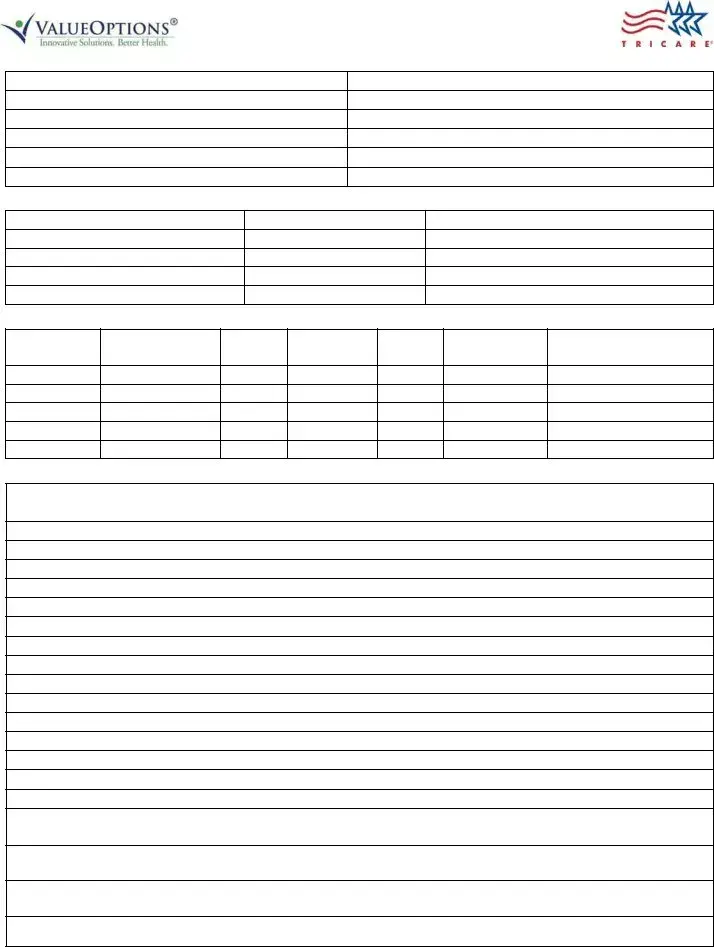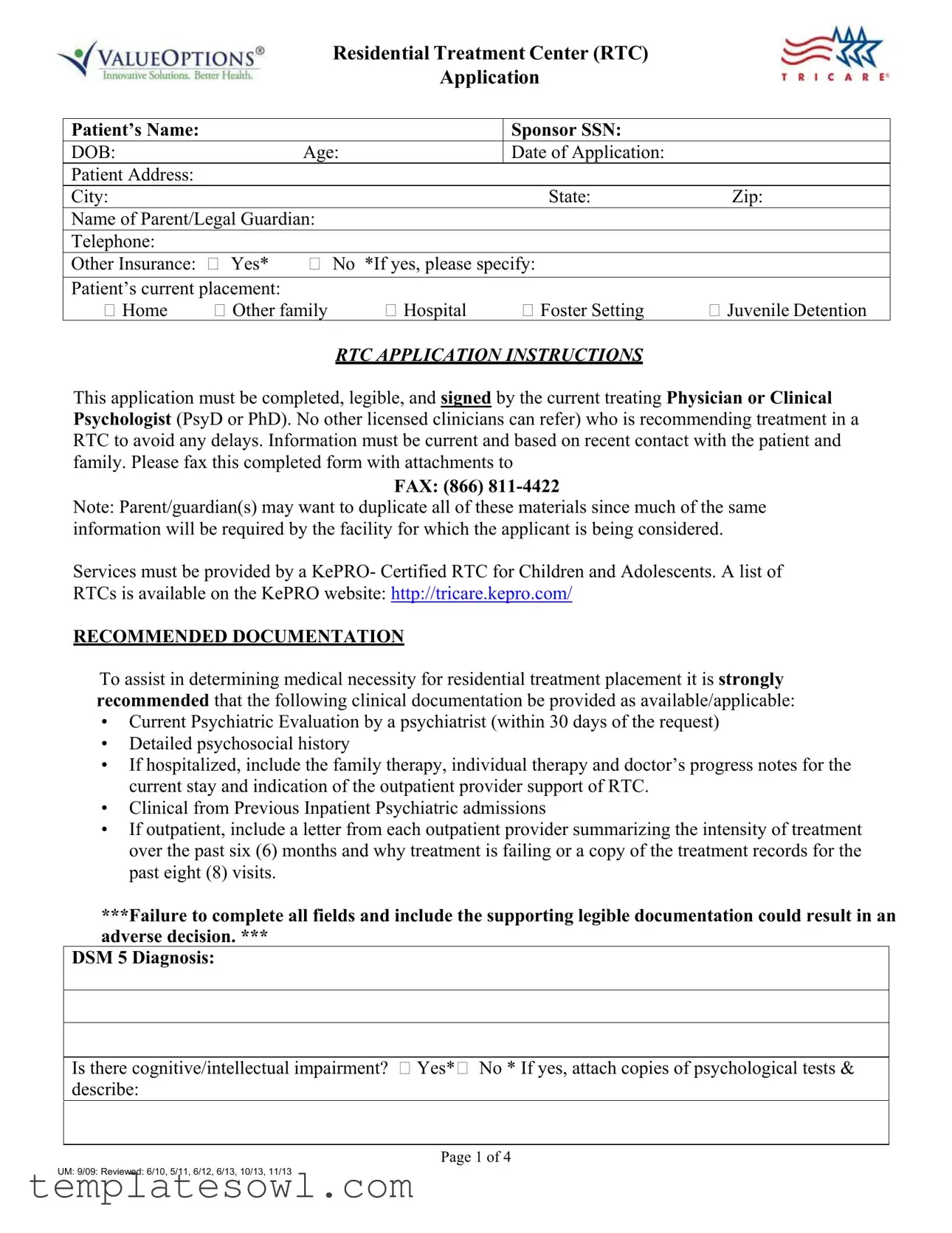Fill Out Your Tricare Rtc Application Form
The Tricare RTC Application form is a crucial tool for families seeking residential treatment for children and adolescents. It captures essential information such as the patient’s name, sponsor Social Security Number, date of birth, and current address. Space is provided for the legal guardian's contact details and whether the patient has other insurance coverage. Understanding the patient's previous placement is important, so parents can indicate if the child is currently living at home, with relatives, in a hospital, in foster care, or in juvenile detention. Completing the application accurately is vital. It must be signed by the child's current treating physician or clinical psychologist and cannot be filled out by other licensed clinicians. Accurate and timely information helps prevent delays in processing. Additional clinical documentation, like psychiatric evaluations and treatment history, supports the request for RTC placement. Families should be prepared to make copies of the application and relevant documents for the receiving facility. This application emphasizes the need for comprehensive records, as incomplete submissions may lead to adverse decisions. Ultimately, it serves as both an application and a roadmap for gathering necessary information that demonstrates the patient’s need for residential treatment.
Tricare Rtc Application Example

Residential Treatment Center (RTC)
Application
Patient’s Name: |
|
|
|
Sponsor SSN: |
|
DOB: |
|
Age: |
|
Date of Application: |
|
Patient Address: |
|
|
|
|
|
City: |
|
|
|
State: |
Zip: |
Name of Parent/Legal Guardian: |
|
|
|
||
Telephone: |
|
|
|
|
|
Other Insurance: Yes* |
No |
*If yes, please specify: |
|
||
|
|
|
|
|
|
Patient’s current placement: |
|
|
|
|
|
Home |
Other family |
Hospital |
Foster Setting |
Juvenile Detention |
|
RTC APPLICATION INSTRUCTIONS
This application must be completed, legible, and signed by the current treating Physician or Clinical Psychologist (PsyD or PhD). No other licensed clinicians can refer) who is recommending treatment in a RTC to avoid any delays. Information must be current and based on recent contact with the patient and family. Please fax this completed form with attachments to
FAX: (866)
Note: Parent/guardian(s) may want to duplicate all of these materials since much of the same information will be required by the facility for which the applicant is being considered.
Services must be provided by a KePRO- Certified RTC for Children and Adolescents. A list of RTCs is available on the KePRO website: http://tricare.kepro.com/
RECOMMENDED DOCUMENTATION
To assist in determining medical necessity for residential treatment placement it is strongly recommended that the following clinical documentation be provided as available/applicable:
•Current Psychiatric Evaluation by a psychiatrist (within 30 days of the request)
•Detailed psychosocial history
•If hospitalized, include the family therapy, individual therapy and doctor’s progress notes for the current stay and indication of the outpatient provider support of RTC.
•Clinical from Previous Inpatient Psychiatric admissions
•If outpatient, include a letter from each outpatient provider summarizing the intensity of treatment over the past six (6) months and why treatment is failing or a copy of the treatment records for the past eight (8) visits.
***Failure to complete all fields and include the supporting legible documentation could result in an adverse decision. ***
DSM 5 Diagnosis:
Is there cognitive/intellectual impairment? Yes* No * If yes, attach copies of psychological tests & describe:
Page 1 of 4
UM: 9/09: REVIEWED: 6/10, 5/11, 6/12, 6/13, 10/13, 11/13

Residential Treatment Center (RTC)
Application
Are there any significant physical or medical problems? Yes* No If yes, please describe:
Describe in detail patient’s current condition, including mental status and behavior symptoms, for which Residential Treatment might be necessary.
Reasons why the patient cannot be treated at a lower level of care?
What attempts have been made to treat the patient with the maximum intensity of services available at a less intensive level of care, especially within the past 6 months:
Treatment/Involvement |
Provider(s) |
Frequency |
Start/End |
Comments |
|
|
|
Dates |
|
Individual Therapy |
|
|
|
|
Family Therapy |
|
|
|
|
Partial Hospital |
|
|
|
|
Psychiatric Medication |
|
|
|
|
Management |
|
|
|
|
|
|
|
|
|
Psychiatric |
|
|
|
|
|
|
|
|
|
Hospitalization(s) (last 3 |
|
|
|
|
|
|
|
|
|
years) |
|
|
|
|
|
|
|
|
|
|
|
|
|
|
Community Services |
|
|
|
|
Child Protective Services |
|
|
|
|
Arrests/Legal Charges |
|
|
|
|
School Services |
|
|
|
|
Military Agencies |
|
|
|
|
Case Management |
|
|
|
|
Page 2 of 4
UM: 9/09: REVIEWED: 6/10, 5/11, 6/12, 6/13, 10/13, 11/13

Residential Treatment Center (RTC)
Application
Current Psychiatric Medications
Dose/Frequency
Past Psychiatric Medication Trials
Start/End Date
Results/Reason for Discontinuation
Substance Type
Amount/Frequency
Duration Age Started
Last Use Treatment
Outcome/Results
Describe patient’s current family structure (living situation, parental roles, family strengths, areas needing improvement):
List goals necessary and attainable for the patient/family within a Residential Treatment setting. Treatment duration may be several months:
1.
2.
3.
Page 3 of 4
UM: 9/09: REVIEWED: 6/10, 5/11, 6/12, 6/13, 10/13, 11/13

Residential Treatment Center (RTC)
Application
If family involvement is therapeutically contraindicated, please explain.
Are any barriers anticipated with reunification back into the family home after discharge from RTC?
Family Therapy Requirements:
If the custodial parent resides within 250 miles of the RTC, the custodial parent/family is encouraged to participate in weekly
If the custodial parent resides more than 250 miles from the RTC, the custodial parent/family is encouraged to participate in monthly
therapy (GDFT).
This requirement has been discussed with the custodial parent; they understand and agree to participate
YES NO
Name of local therapist proposed to participate in GDFT, if applicable:
Requested Facility:
Estimated Length of Stay:
|
|
|
|
Licensure type: MD DO PsyD |
PhD |
Provider NPI # |
|
|
|
||
(No other licensure type accepted) |
|
|
|
|
|
|
|
Provider Address: |
|
|
|
|
|
|
|
City: |
|
State: |
Zip: |
|
|
|
|
Provider Telephone: |
|
Provider Fax: |
|
|
|
|
|
Provider Point of Contact: |
|
Telephone: |
|
|
|
|
|
Physician/Psychologist Certification: |
|
|
|
I certify that I am the person rendering this patient’s face to face clinical services and the above statements are true and I have obtained appropriate signed release for all information provided to TRICARE South Division Behavioral Health.
Provider Printed Name:
Provider Signature: |
Date: |
|
|
Complete all fields in this application. Indicate “N/A” for sections that are not applicable.
In order for ValueOptions® to communicate healthcare related information to anyone other than the
beneficiary/patient Authorization for Release of Information (ROI) forms may be required even for minor children.
Page 4 of 4
UM: 9/09: REVIEWED: 6/10, 5/11, 6/12, 6/13, 10/13, 11/13
Form Characteristics
| Fact | Description |
|---|---|
| Application Requirement | The RTC application must be completed and signed by a current treating Physician or Clinical Psychologist with a PsyD or PhD. Other licensed clinicians cannot make referrals. |
| Document Submission | It's essential to fax the completed form, along with all required documentation, to (866) 811-4422 promptly to avoid delays in the application process. |
| KePRO Certification | Services through the RTC must come from a KePRO-Certified facility focusing on children and adolescents. Information is available at the KePRO website. |
| Medical Necessity | Documentation, like current psychiatric evaluations and treatment history, must support the medical necessity for residential treatment, aiding in the review process. |
| Family Involvement | Family therapy requirements depend on the distance of the custodial parent from the RTC. Participation is encouraged and should be discussed with the family. |
Guidelines on Utilizing Tricare Rtc Application
Gather your information carefully before proceeding with the Tricare RTC Application form. Ensuring accuracy will help streamline the process and avoid potential delays. Below are the steps to fill out the form correctly.
- Start by entering the Patient’s Name at the top of the form.
- Fill in the Sponsor SSN (Social Security Number) of the patient’s sponsor.
- Provide the DOB (Date of Birth) and Age of the patient.
- Fill in the Date of Application.
- Enter the Patient Address, including City, State, and Zip.
- Write down the Name of Parent/Legal Guardian for the patient.
- Include a Telephone number for easy contact.
- Indicate whether there is Other Insurance with a “Yes” or “No” mark. If yes, please specify.
- Choose the Patient’s current placement from the options: Home, Other family, Hospital, Foster Setting, or Juvenile Detention.
- Ensure the form is legible and signed by the current treating Physician or Clinical Psychologist. No other clinicians may sign.
- Prepare to gather and attach required clinical documentation, including a Current Psychiatric Evaluation and a Detailed psychosocial history if applicable.
- Include any relevant clinical notes if the patient has been hospitalized recently, detailing therapy sessions and progress.
- Detail the patient’s current condition, including mental status and behavioral symptoms.
- Summarize the reasons why residential treatment is necessary and what lower levels of care have been attempted.
- List the current psychiatric medications, including dosage and frequency.
- Describe the family structure, noting strengths and areas for improvement.
- Identify achievable goals within the residential treatment setting.
- If applicable, explain why family involvement is contraindicated.
- Discuss anticipated barriers to reunification after discharge.
- Fill out the Requested Facility and Estimated Length of Stay.
- Complete the Physician/Psychologist Certification section, ensuring your name and signature are included.
- Finally, fax the completed application and any attachments to FAX: (866) 811-4422.
After submission, it’s important to retain a copy of the application and any additional documentation. This can be helpful for follow-up purposes or if any questions arise during the review process. Stay informed and proactive during this critical time.
What You Should Know About This Form
What is the purpose of the TRICARE RTC Application form?
The TRICARE Residential Treatment Center (RTC) Application form is used to seek inpatient treatment for children and adolescents who require specialized care. It gathers essential information to determine medical necessity for placement in a certified RTC. This helps ensure that applicants receive the appropriate help for their mental health needs.
Who needs to complete and sign the application?
The application must be completed by the patient’s current treating Physician or Clinical Psychologist (PsyD or PhD). No other licensed clinicians are permitted to fill out this form. The treating provider must sign the application to validate the recommendation for RTC treatment.
What documentation is required to accompany the application?
To support the application, specific clinical documentation should be included. This includes a current psychiatric evaluation, detailed psychosocial history, progress notes from any recent hospital stay, and letters from outpatient providers if applicable. These documents help demonstrate the patient's need for residential treatment and the intensity of previous care received.
What happens if the application is incomplete?
Completing all fields in the application is crucial. Failure to provide all necessary information and documentation could lead to delays or an adverse decision on the application. It is essential to ensure everything is filled out legibly and correctly to prevent complications.
How do I submit the completed application?
Once the application is completed, it should be faxed to the specified number: (866) 811-4422. It’s recommended to keep a copy of the application and any attachments for your records, as the facility may require the same information.
Is family involvement required during treatment?
Yes, family involvement is often crucial in the treatment process. If the custodial parent lives within 250 miles of the RTC, they are encouraged to participate in weekly on-site family therapy. For those living further away, monthly on-site therapy and weekly distance therapy sessions are recommended. This involvement can significantly enhance the effectiveness of the treatment.
Where can I find a list of TRICARE-certified RTCs?
A list of KePRO-certified Residential Treatment Centers can be found on the KePRO website at http://tricare.kepro.com/. It is important to ensure that the selected RTC is certified, as services must comply with TRICARE standards.
Common mistakes
When filling out the Tricare RTC Application form, many individuals make common mistakes that can lead to delays in processing or even an adverse decision. One significant error is failing to provide complete and accurate information. Each section of the application must be filled out thoroughly. Leaving out required details can raise red flags and slow down the entire review process. Always double-check that every field is completed, even those that may not seem applicable—marking them as “N/A” helps clarify intent.
Another frequent mistake involves submission without appropriate signatures. The form must be signed by the current treating physician or clinical psychologist. Without this critical signature, the application may be deemed incomplete. It’s crucial to ensure that all required signatures are in place before submitting the application to avoid unnecessary delays.
Additionally, individuals sometimes underestimate the importance of providing supporting documentation. The application should come with various clinical documents, such as psychiatric evaluations and treatment history. Missing documentation can result in questions about the medical necessity of residential treatment, which could jeopardize approval. Make sure to include any requested records and follow the guidelines for what is required.
Using illegible handwriting is yet another issue that can complicate the application process. The form needs to be clear and readable. If a reviewer cannot understand the information provided, they may not process the application correctly, which can lead to unnecessary delays. Consider filling out the form electronically if possible, or practice neat handwriting if you must complete it by hand.
Lastly, individuals sometimes fail to communicate clearly about the patient’s current situation. Take the time to provide detailed descriptions of the patient’s condition and the reasons for seeking residential treatment. This description is critical for justifying the need for a more intensive level of care. A well-articulated explanation will help the decision-makers understand the context and urgency of the situation.
Documents used along the form
The following documents are often required alongside the Tricare RTC Application form. Each plays a crucial role in supporting the application and ensuring a thorough review of the patient’s situation.
- Current Psychiatric Evaluation: A comprehensive assessment by a psychiatrist, conducted within the last 30 days, outlines the patient’s mental health status and treatment needs.
- Detailed Psychosocial History: This document provides an overview of the patient’s life circumstances, relationships, and past treatment experiences, crucial for understanding their needs.
- Hospitalization Records: Include therapy notes and progress reports from any recent hospital stays. This documentation offers insights into the patient's recent treatment interventions.
- Previous Inpatient Psychiatric Admissions: Summaries of past inpatient treatments can help illustrate the patient’s history and treatment response over time.
- Letters from Outpatient Providers: Providers should summarize treatment intensity and reasons for failure at lower care levels. This letter supports the need for RTC placement.
- Psychological Test Results: If applicable, provide copies of tests designed to assess cognitive or intellectual impairments, assisting in understanding the patient's capabilities.
- Family and Treatment Involvement Documentation: A description of family dynamics, support systems, and treatment history over the past six months demonstrates the patient’s context for care.
- Authorization for Release of Information (ROI) forms: These forms are necessary to allow healthcare professionals to share information about the patient, particularly if they are a minor.
- Goals List for Residential Treatment: Documenting achievable goals for the patient’s time in treatment helps clarify objectives and treatments needed during their stay.
Collecting and submitting these documents promptly can prevent delays in the application process and improve outcomes for the patient. Each piece of information contributes to a clearer understanding of the patient’s needs and treatment history, fostering effective evaluation and decision-making by the facility.
Similar forms
The TRICARE RTC Application form shares similarities with various other important documents that actively support individuals seeking treatment. Understanding these similarities can guide parents and guardians through necessary paperwork. Each of the following documents serves a unique purpose but overlaps significantly in terms of content, structure, and the need for detailed patient information.
- Patient Intake Form: Like the RTC application, this document collects personal information about the patient, including medical history and current treatment status. It often requires the signature of a healthcare provider to verify accuracy, emphasizing the importance of physician involvement.
- Consent for Treatment Form: Both forms need to be filled out by a parent or legal guardian and usually require similar demographic and identifying information. They also highlight the necessity of informed consent before treatment begins, promoting the safety and rights of the patient.
- Psychoeducational Assessment Request: This document typically requests detailed clinical evaluations and histories, much like the RTC application. Both aim to assess the patient’s current condition and level of need for comprehensive support.
- Psychiatric Evaluation Report: Similar to the medical documentation required for the RTC application, this report provides an assessment of the patient's mental state and behavior. It serves to support treatment decisions and may need to be submitted alongside the application.
- Treatment Plan Format: A treatment plan often includes patient goals and therapeutic interventions, paralleling the goal-setting aspect of the RTC application. Both documents are focused on outlining specific pathways for improvement and necessary services.
- Insurance Benefits Verification Form: This document confirms coverage and eligibility for treatment services. In many ways, it mirrors the RTC application in its request for detailed information about insurance and treatment provisions.
- Referral Form to a Specialist: Referral forms typically necessitate comprehensive patient data and a provider’s recommendation. They align with the RTC application’s requirement of a physician’s endorsement to help facilitate timely and appropriate care.
- Discharge Summary from Previous Treatment: Both documents include historical treatment details vital for continuity of care. Discharge summaries need to summarize prior interventions, similar to how the RTC application requires accounts of past therapies and outcomes.
- Family Assessment Questionnaire: This questionnaire gathers insights about the family dynamics and social support systems, akin to the RTC application’s request regarding family structure. Both emphasize the family’s role in the patient’s recovery process.
- Authorization for Release of Information (ROI): Like the RTC application, ROIs demand explicit consent for sharing sensitive information. They are crucial when coordinating care among various healthcare providers and ensuring that all pertinent information is received.
Each of these documents not only supports the treatment process but also serves as a reminder of the meticulous information required for appropriate healthcare outcomes. Consequently, accuracy and completeness in filling out all relevant forms are essential. Being well-prepared can significantly reduce delays and enhance the quality of care for patients.
Dos and Don'ts
When filling out the Tricare RTC Application form, there are important dos and don’ts to keep in mind to ensure a smooth process.
- Do complete all fields in the application accurately.
- Do provide current and detailed psychiatric evaluations.
- Do ensure that the form is signed by the treating physician or clinical psychologist.
- Do fax all documentation to the correct number: (866) 811-4422.
- Do duplicate all materials for your own records.
- Don't leave any section blank; write “N/A” if applicable.
- Don't use outdated or irrelevant information in the application.
- Don't forget to include supporting documents that may be required for medical necessity.
- Don't assume that any licensed clinician can sign the application; it must be the treating physician or psychologist.
- Don't ignore the importance of family involvement if recommended by the RTC.
Following these guidelines will help you submit a complete and effective application.
Misconceptions
Misunderstandings about the Tricare RTC Application form can create confusion and delays in accessing much-needed treatment. Here are several common misconceptions.
- Only doctors can fill out the application. While a physician or clinical psychologist must sign the application, anyone can assist with gathering information and completing the form.
- The RTC application is the only document needed. Along with the application, attaching supporting documents, such as psychiatric evaluations and treatment history, is essential for a thorough review.
- Including prior treatments isn’t necessary. Previous treatment details help establish the patient’s history and demonstrate why RTC is necessary. Without this context, the application may be viewed as incomplete.
- The application can be faxed without a cover sheet. It is recommended to include a cover sheet with the application to ensure it reaches the appropriate department and is processed quickly.
- All RTCs accept Tricare. Not every Residential Treatment Center is certified to accept Tricare. Always verify that the facility is KePRO-certified before submitting your application.
- Physical health issues don’t need to be mentioned. Any significant physical or medical problems should be described as they may impact treatment decisions and the patient's overall care.
- If a patient has private insurance, they cannot apply for RTC through Tricare. Even if a patient has other insurance, they can still apply for Tricare support; disclosure of other coverage is mandatory.
- Application fields can be left blank if unknown. All fields must be filled out to the best of your knowledge. If a section is not applicable, indicate “N/A” instead of leaving it blank.
- The process is quick and informal. The review process can be lengthy. Providing comprehensive and clear information from the start can help expedite decisions.
- The current treating physician doesn't have to be involved. The current treating physician or licensed clinical psychologist must provide their signature and approval for the application to move forward.
By understanding these common misconceptions, families can better navigate the RTC application process and increase the likelihood of timely access to necessary treatment.
Key takeaways
When filling out the Tricare RTC Application form, there are several important points to consider to ensure a smooth process. Below are key takeaways that can help guide you through the application.
- Accurate and Complete Information: It is crucial to fill out all fields of the application comprehensively. Indicate "N/A" for any sections that do not apply to avoid potential delays.
- Current Documentation: Providing up-to-date clinical documentation is essential. This includes psychiatric evaluations and therapy progress notes that are current and relevant to the patient's condition.
- Signature Requirement: The application must be signed by a qualified healthcare provider, such as a physician or clinical psychologist, to validate the need for treatment.
- Reunification Considerations: Anticipate barriers related to family reunification post-treatment. Be prepared to discuss family dynamics and any family therapy requirements that may arise during the process.
Browse Other Templates
Common App Step by Step - State your intended college and related details in this section.
Estes Bill of Lading Pdf - Essential for tracking shipments and ensuring accountability.
